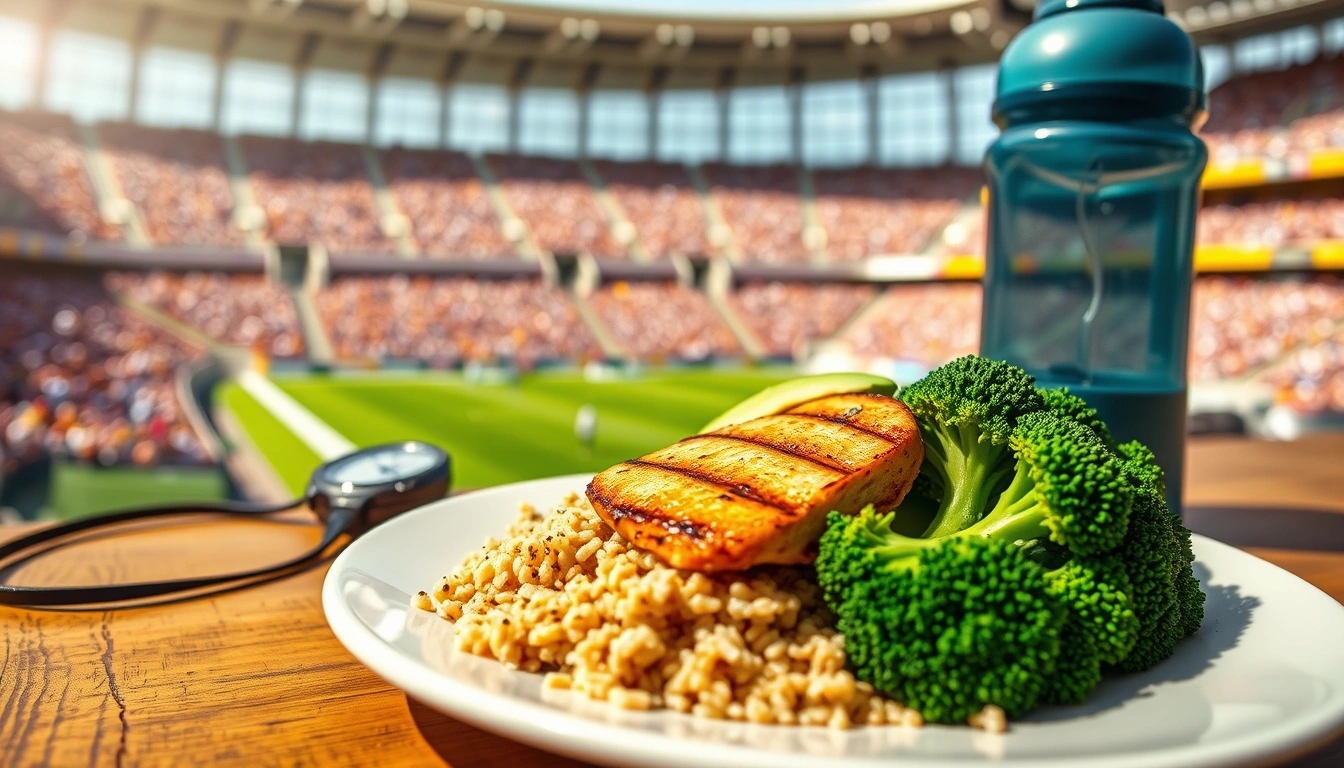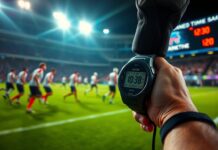Fueling up right before you hit the field? Oh, it’s a total game-changer. You might think, “Eh, I’ll just grab whatever’s handy,” but trust me, your body’s a finicky beast and it demands respect — especially when you’re about to give it your all. Eating smart before a match isn’t just about shoving food down your throat; it’s about timing, choosing the right nutrients, and avoiding those sneaky pitfalls that can leave you feeling like a soggy noodle halfway through the game.
Timing Is Everything
Let’s get this straight: eating too close to kickoff can turn you into a sluggish mess, while waiting too long might have your stomach growling louder than the crowd. Ideally, you want a solid meal about 3-4 hours before the match. This gives your body enough time to digest and convert that food into usable energy. If you’re hungry closer to game time, a light snack 30-60 minutes prior can help, but keep it small and simple.
| When to Eat | What to Eat | Why |
|---|---|---|
| 3-4 hours before | Balanced meal with carbs, protein, moderate fats | Allows digestion and energy storage |
| 30-60 minutes before | Light carbs, easy to digest | Quick energy without stomach upset |
Carbs: Your Best Friend or Foe?
Carbs get a bad rap sometimes, but they’re basically the MVP of pre-match nutrition. Your muscles and brain run on glycogen, which comes from carbs. But don’t just grab any carb — think quality over quantity. Complex carbs like whole grains, oats, and sweet potatoes release energy steadily, while simple carbs (looking at you, candy bars) might give you a quick burst but leave you crashing hard. If you’re munching right before the match, stick to easy-to-digest simple carbs like a banana or a slice of toast.
- Complex carbs: brown rice, quinoa, whole wheat bread
- Simple carbs: fruit, honey, white bread (in moderation)
Protein and Fats: How Much Is Too Much?
Protein is essential, sure, but loading up on it right before the game? Not the best idea. Too much protein or fat can slow digestion, leaving you feeling heavy and sluggish. Think of fats and proteins as the slow burners — they’re great for recovery and sustained energy, but pre-game? Keep it light. A small amount of lean protein (like chicken or yogurt) paired with some healthy fats (avocado, nuts) is just enough.
Hydration Hacks
Water is obvious, but here’s the kicker: when you drink matters as much as how much. Chugging a gallon right before kickoff? Bad move — you’ll feel bloated and uncomfortable. Instead, hydrate steadily throughout the day and sip on water leading up to the match. Electrolyte drinks can also help if you’re sweating buckets.
| Hydration Timing | Amount |
|---|---|
| 2 hours before | 500 ml water |
| 30 minutes before | 200-300 ml water or sports drink |
Snacks That Pack a Punch
Sometimes, you just need a quick fix. Here are some snack ideas that won’t weigh you down but will keep your energy buzzing:
- Banana with a spoonful of peanut butter
- Greek yogurt with honey
- Energy bars (watch the sugar!)
- Rice cakes with almond butter
Foods to Avoid Like the Plague
Trust me, you don’t want to be the guy clutching his stomach mid-game because of some dodgy food choices. Stay clear of:
- Greasy, fried foods
- Heavy dairy (if you’re lactose intolerant)
- Excessive caffeine
- High fiber meals right before playing
Sample Pre-Match Meal Plans
Here’s a quick look at what you might eat depending on your match time:
| Match Time | Meal |
|---|---|
| Morning match | Oatmeal with banana + small handful of nuts |
| Afternoon match | Grilled chicken, quinoa, steamed veggies |
| Evening match | Whole wheat pasta with tomato sauce + lean protein |
Listening to Your Body
No two athletes are the same. What works wonders for your teammate might leave you feeling like a lead balloon. Pay attention to how your body reacts to different foods and tweak accordingly. It’s a bit of trial and error, but worth it.
Common Myths and Misconceptions
Forget those old wives’ tales about “carb loading” the night before or avoiding all fats. Sports nutrition is nuanced, and blanket rules rarely work. Stay curious, stay flexible, and don’t be afraid to experiment.
So yeah, eating before a match is part science, part art, and part common sense. Nail it, and you’ll feel like you could run circles around your opponents. Mess it up? Well, let’s just say, you’ll wish you’d stuck to the plan. Good luck out there!
Timing Is Everything</h2
Timing Is Everything
When it comes to prepping your body for a match, timing your meals is more than just a suggestion—it’s practically an art form. You might think, “Hey, just eat whenever and crush it,” but trust me, that’s a rookie move. Eating too close to game time can leave you feeling like you swallowed a brick, while waiting too long might have your stomach growling louder than the crowd. Finding that sweet spot is key to staying sharp and energized without the annoying sluggishness or those distracting hunger pangs.
- Eat too early: Your energy might dip before the game even starts.
- Eat too late: You risk cramps, bloating, or that uncomfortable full feeling.
- Eat just right: You’re fueled and ready, with energy to burn.
So, what’s the magic window? Most sports nutritionists recommend finishing your main meal about 3 to 4 hours before kickoff. This gives your body enough time to digest and convert food into usable energy. Think of it like fueling a car—you don’t want to fill the tank moments before a road trip or you’ll just spill gas everywhere. Instead, fill up well ahead of time.
Now, if you’re the type who can’t stomach a big meal that early, no worries. A smaller, carb-focused snack about 30 to 60 minutes before the game can do wonders. But beware: this snack should be light and easy to digest. Avoid heavy proteins or fats here unless you want to feel like you’re running with a lead weight strapped to your gut.
| Timing | Recommended Food | Why? |
|---|---|---|
| 3-4 hours before | Balanced meal: carbs, moderate protein, low fat | Allows digestion and energy storage |
| 30-60 minutes before | Light carb snack (banana, toast, energy bar) | Quick energy boost without heaviness |
| During breaks | Hydration + small carb bites | Maintain energy and focus |
Here’s a little secret: everyone’s body is a bit of a diva. Some players swear by eating way earlier, others prefer a tiny nibble just before hitting the field. The key is to experiment during practice days, not match day. You don’t want to find out that your pre-game meal is a disaster when the crowd’s roaring and the stakes are high.
Pro tip: Keep a food diary noting what you eat and how you feel during the game. Over time, you’ll figure out your personal “golden hour” for eating. Because, honestly, what works for your teammate might leave you feeling like a sloth.
In conclusion, nailing your meal timing isn’t rocket science, but it does take some trial, error, and a bit of patience. Miss this, and you’re either dragging your feet or battling hunger mid-play. Get it right, and you’re powering through like a champ.
Carbs: Your Best Friend or Foe?</h2
Carbs: Your Best Friend or Foe?
When it comes to pre-game nutrition, carbohydrates often get the spotlight as the primary fuel source. But let’s be real—not all carbs are created equally, and lumping them all together is like saying every pizza slice tastes the same (spoiler: it doesn’t). So, what should you really be loading up on before you hit the field? Let’s break it down.
First off, simple carbs might sound like the enemy because they spike your blood sugar fast, but in the right moment, they’re actually your best buddy. Think ripe bananas, white bread, or even a bit of honey. These quick-digesting carbs give you that instant energy surge, perfect if you’re eating 30-60 minutes before kickoff. But be careful—too much and you might crash hard mid-game, leaving you feeling like a deflated balloon.
Now, onto the complex carbs. These bad boys take longer to break down, providing a slow and steady energy release. Whole grains, oats, sweet potatoes, and brown rice fall into this category. If you have a couple of hours before the match, complex carbs are your go-to. They keep your energy stable and help avoid that dreaded “hanger” feeling when you’re starving but can’t eat mid-game.
| Carb Type | Examples | When to Eat | Why |
|---|---|---|---|
| Simple Carbs | Bananas, white bread, honey | 30-60 mins before | Quick energy spike |
| Complex Carbs | Oats, brown rice, sweet potatoes | 2-3 hours before | Slow, sustained energy |
But hey, not all carbs are winners. Refined sugars and processed snacks like candy bars or sodas might give you a quick buzz, but they often come with a side of bloating or energy crash. Plus, your stomach might throw a tantrum mid-game—not fun.
- Pro tip: Combine carbs with a little protein and fat for a balanced meal. It slows digestion and keeps you fueled longer.
- Don’t forget to test your meal timing during practice. What works for one player might be a disaster for another.
- And if you’re feeling adventurous, try carb-loading the night before a big game—but keep it wholesome.
So, are carbs your best friend or foe? Honestly, they’re both. It all boils down to timing, type, and quantity. Mess it up, and you’re dragging your feet on the field; get it right, and you’ll be powering through like a champ. Just remember: carbs aren’t the enemy—they’re your secret weapon when used wisely.
Quick Reminder:- Eat complex carbs 2-3 hours before match.- Snack on simple carbs 30-60 mins prior.- Avoid heavy processed sugars.- Test your routine during practice, not game day.
Protein and Fats: How Much Is Too Much?</h2
Protein and Fats: How Much Is Too Much?
Alright, let’s get real about protein and fats before a match — it’s like walking a tightrope without a safety net. You want enough to keep your muscles fueled and your energy steady, but go overboard and suddenly you’re dragging like you just ran a marathon in a suit of armor. Too little? Well, you’ll be gnawing on your own arm halfway through the game, trust me.
First off, protein is the muscle-builder, the repair guy, the MVP when it comes to recovery and endurance. But stuffing your face with a steak the size of your head right before kickoff? Not the best call. Your body needs time to break down that protein, and if you pile it on too close to game time, it’s gonna sit heavy in your stomach like a brick. You’ll feel sluggish, maybe even a bit nauseous — definitely not the “bring it on” energy you want.
- Ideal protein intake: Aim for a moderate amount, around 10-20 grams, about 2-3 hours before the match.
- Sources: Think lean chicken, turkey, eggs, or Greek yogurt — stuff that’s easy to digest.
- Avoid: Fatty cuts of meat or heavy protein shakes right before playing.
Now, fats are the sneaky energy source. They’re slow burners, which is great for long-term endurance but not so great if you want a quick burst of energy. Too much fat pre-game and you’re basically carrying a lead weight. Your digestion slows, blood flow diverts to your stomach instead of your muscles, and bam — you’re feeling like a sloth in cleats.
| Fat Type | Good or Bad Pre-Game? | Examples |
|---|---|---|
| Unsaturated Fats | Good (in moderation) | Avocado, nuts, olive oil |
| Saturated Fats | Limit | Butter, cheese, fatty meats |
| Trans Fats | Absolutely avoid | Processed snacks, fried foods |
So, what’s the magic number? Honestly, it varies per player and sport, but a general rule of thumb is to keep fat intake light — around 10-15 grams — in the 2-3 hours before you hit the field. If you’re snacking closer to game time, stick to carbs and minimal protein, and save the fats for after the final whistle.
Here’s a quick checklist for pre-match protein and fat balance:
- Eat protein and fats 2-3 hours before the match.
- Keep protein moderate, fats light.
- Choose lean proteins and healthy fats.
- Avoid heavy, greasy, or processed foods.
- Listen to your body — if you feel heavy or sluggish, adjust accordingly next time.
To wrap it up, balancing protein and fats before a match isn’t rocket science, but it’s definitely a bit of an art. You want to fuel up smartly, not overload your system. Too much protein and fats equals a slow, tired you; too little and you’re running on empty. Play around with timing and portions, and you’ll find that sweet spot where you feel strong, energized, and ready to crush it.
Remember, every athlete is different — so what works for your buddy might leave you feeling like a couch potato. Experiment, take notes, and soon enough, you’ll eat like a pro and perform like one too.
Hydration Hacks</h2
Hydration Hacks
Okay, let’s get real about hydration before a match. Everyone’s heard the old chestnut, “Drink water!” but it’s not just about gulping down a gallon right before kickoff and hoping for the best. Nah, hydration is a bit more of an art form than that, and if you get it wrong, you’ll feel like a soggy sponge or worse, a dried-out raisin on the field. Both are equally tragic in their own way.
First off, timing is key. Chugging water 5 minutes before the game? Not the best move. Your stomach will be doing somersaults, and your focus? Poof. Instead, aim to hydrate steadily starting at least two hours before the match. This gives your body enough time to absorb the fluids and get your system humming. Then, about 20-30 minutes before kickoff, take a small drink—think a few sips, not a firehose blast. Keep it chill.
- Two hours before: Drink about 500ml (roughly two cups) of water.
- 30 minutes before: Sip 200-300ml to top off hydration.
- During the match: If possible, keep sipping small amounts regularly, especially if it’s hot or you’re sweating buckets.
But wait, it’s not just about plain water. Electrolytes play a sneaky but crucial role here. When you sweat, you lose sodium, potassium, and other minerals that help your muscles work and keep cramps at bay. So if you’re a heavy sweater or the game’s in blazing sun, consider a sports drink or electrolyte tablets mixed with your water. Just don’t go overboard with sugary drinks; they might give you a quick buzz but will leave you crashing faster than you can say “half-time.”
| Hydration Tip | Why It Matters | Quick Advice |
|---|---|---|
| Start Early | Allows your body to fully absorb fluids and avoid last-minute bloating | Drink steadily 2 hours before the match |
| Electrolyte Balance | Prevents cramps and maintains muscle function | Use low-sugar sports drinks if sweating heavily |
| Small Sips During Play | Keeps hydration steady without upsetting your stomach | Sip 100-200ml every 15-20 minutes |
Now, a quick heads-up: don’t rely on thirst as a hydration gauge. By the time you’re thirsty, you’re already a bit dehydrated, and that’s a slippery slope to fatigue and poor concentration. Also, if you’re thinking, “Hey, coffee or energy drinks count, right?”—well, not really. Caffeine can mess with your hydration levels and might make you pee more, which is the last thing you want mid-game.
Finally, let’s not forget that hydration needs can be wildly different from person to person. Some folks sweat buckets, others barely break a sweat; some need more electrolytes, others less. The best advice? Experiment during training sessions, not match day. Figure out what works for you, and stick to it.
In short, hydration isn’t just about drinking water, it’s about drinking smart. Nail the timing, balance those electrolytes, and keep sipping steadily. Your stamina, focus, and maybe even your victory dance might just thank you.
Snacks That Pack a Punch</h2
Snacks That Pack a Punch
Alright, let’s get real for a moment. When you’re gearing up for a match, the last thing you want is to feel like you just swallowed a brick. But hey, we’ve all been there—chowing down on some “energy bar” that’s basically a sugar bomb or a dense sandwich that sticks to your ribs like glue. So, what’s the deal with snacks that actually fuel you up without weighing you down? Here’s the lowdown.
First off, timing is everything. Snacking too close to game time? You might end up with a stomach full of lead. Too early? Hunger pangs might sneak up on you mid-play. Aim for a snack about 60-90 minutes before kickoff. That’s when your body can properly digest and convert food into usable energy.
- Go for carbs that are easy on the stomach. Think ripe bananas, a small bowl of oatmeal, or rice cakes. These carbs break down quickly and give you that quick energy boost without the crash.
- Don’t shy away from a little protein. A handful of nuts or a spoonful of peanut butter can keep you feeling fuller longer and stabilize your blood sugar.
- Hydration’s your secret weapon. Pair your snack with water or an electrolyte drink, but don’t go overboard right before the match.
| Snack | Why It Works | Quick Tip |
|---|---|---|
| Banana with a spoon of almond butter | Easy carbs + healthy fats for sustained energy | Peel and pack for a grab-and-go snack |
| Greek yogurt with honey and berries | Protein + natural sugars to fuel muscles and brain | Choose low-fat to avoid sluggishness |
| Rice cakes with avocado spread | Light carbs + healthy fats to keep hunger at bay | Prepare fresh to avoid sogginess |
| Trail mix (nuts, seeds, dried fruit) | Balanced mix of fats, protein, and carbs | Watch portion size; easy to overdo |
Now, let’s talk about what to avoid. You want to steer clear of anything too greasy or fiber-heavy right before a match—yeah, that means no double cheeseburgers or piles of broccoli. These can mess with your digestion and leave you feeling sluggish, bloated, or worse, running to the bathroom mid-game (awkward!). Also, sugary snacks might give you a quick buzz but expect a crash that’ll have you dragging your feet by halftime.
If you’re someone who’s always on the move, packing these snacks in your bag is a game-changer. No more frantic searches for “something to eat” in the locker room. Plus, having a reliable snack can keep those pesky hunger pangs at bay and keep your focus razor-sharp.
Quick Snack Checklist Before a Match:- Easy-to-digest carbs ✔️- Moderate protein ✔️- Healthy fats (in moderation) ✔️- Hydration ✔️- Avoid heavy, greasy, or high-fiber foods ❌
So, next time you’re prepping for a game, skip the “brick-like” snacks and opt for these smarter choices. Your body will thank you, and hey, you might just surprise yourself with how much more energized and ready you feel out there. Because let’s face it, nobody wants to be the player who’s dragging their feet because they ate like a rock.
Stay fueled, stay fierce, and snack smart!
Foods to Avoid Like the Plague</h2
Foods to Avoid Like the Plague
Look, fueling up before a match isn’t just about stuffing your face with whatever’s handy. Some foods? They’ll turn your body into a battleground of cramps, bloating, and that sluggish feeling you absolutely don’t want when you’re supposed to be sprinting or scoring. So, here’s a no-nonsense guide on what to dodge if you want to keep your game sharp and your tummy happy.
1. Greasy and Fried Foods
You might love that double cheeseburger or those crispy fries, but right before a match? Big no-no. Greasy foods sit heavy in your stomach, making digestion a slow, painful process. Instead of running fast, you’ll be running on a lead balloon. The fat content delays stomach emptying, which means energy gets stuck in traffic.
2. High-Fiber Foods
Fiber is normally your friend, but pre-game? It’s a bit of a troublemaker. Beans, broccoli, cabbage, and other high-fiber veggies can cause gas and bloating. Imagine trying to focus while your stomach is doing somersaults—that’s a recipe for disaster. Save these for after the match when you can chill and digest at your leisure.
| Food Type | Why Avoid? | Better Alternatives |
|---|---|---|
| Greasy/Fried Foods | Slow digestion, heavy stomach | Grilled chicken, baked potatoes |
| High-Fiber Veggies | Bloating, gas | Carrots, cucumbers |
| Carbonated Drinks | Gas buildup, discomfort | Water, electrolyte drinks |
| Spicy Foods | Can cause stomach upset | Mildly seasoned meals |
3. Carbonated Beverages
Soda or sparkling water might seem refreshing, but the bubbles can cause gas and bloating. You don’t want to be burping mid-play or feeling like your belly’s about to pop. Stick to plain water or sports drinks that hydrate without the fizzy side effects.
4. Sugary Sweets and Candy
Sure, sugar gives you a quick burst of energy, but it’s a classic case of “here now, gone later.” That sugar crash will hit you like a ton of bricks halfway through the game, leaving you drained and cranky. Plus, candy and sweets offer zero nutritional value, so they’re basically empty calories.
- Dairy Products: Milk, cheese, and cream can be tough to digest for many, causing cramps or discomfort.
- Alcohol: Not only dehydrating but also messes with your coordination and focus.
- Heavy Sauces: Think creamy or buttery sauces that add unnecessary fats and slow digestion.
Let’s be real, nobody wants to spend half their match dealing with stomach cramps or feeling like they’re moving through molasses. Avoid these troublemakers, and you’ll give yourself a fighting chance to stay light on your feet and ready to crush it. And hey, if you’ve got a food that’s your secret kryptonite, maybe it’s time to kick it to the curb on game day. Your gut will thank you—and so will your scoreboard.
Quick Recap:
- Avoid fried, greasy foods and heavy fats.
- Skip the high-fiber veggies right before the game.
- Say no to fizzy drinks and sugary snacks.
- Steer clear of spicy and dairy if they upset your stomach.
- Hydrate smartly with water or electrolyte drinks.
Remember, it’s not just what you eat, but when and how much. Play it smart, dodge the food traps, and let your body do what it’s meant to—perform like a champ.
Sample Pre-Match Meal Plans</h2
Sample Pre-Match Meal Plans
When it comes to prepping your stomach before a match, there’s no one-size-fits-all magic bullet. The truth? It’s a bit of a puzzle, and you’ve got to fit the pieces together based on your match time, your personal digestion quirks, and what kind of player you are. So, here’s the deal: practical meal plans that actually work—no guessing, no starving, no feeling like a stuffed turkey on the field.
First things first: The timing of your meal is everything. Eat too close to kickoff and you’ll be dragging your feet, or worse, feeling like you’re carrying a rock in your belly. Eat too early, and hunger pangs might crash your party halfway through the game. Here’s a quick cheat sheet:
- 3-4 hours before the match: Go for a balanced meal with carbs, moderate protein, and low fat.
- 1-2 hours before the match: Opt for a light snack, mostly carbs, easy to digest.
- 30-60 minutes before: If you must eat, keep it super light and simple—think fruit or a small energy bar.
Now, let’s get into some meal plan ideas tailored to different match times and player needs. Because, let’s be honest, what works for your buddy might turn your stomach into a battleground.
| Match Time | Meal Plan | Why It Works |
|---|---|---|
| Morning Match (8-10 AM) |
| Slow-release carbs for sustained energy without heaviness. |
| Afternoon Match (1-3 PM) |
| Balanced macros to keep you fueled and avoid mid-game slumps. |
| Evening Match (6-8 PM) |
| Carbs for energy, protein for recovery, and controlled hydration to avoid bathroom breaks. |
What about snacks? Glad you asked. Sometimes, your match doesn’t align with a full meal schedule, or you just need a quick pick-me-up. Here are a couple of go-to snack combos:
- Apple slices with almond butter
- Rice cakes topped with a thin layer of peanut butter and honey
- Small handful of dried fruits and nuts (watch the portions!)
Remember, these plans aren’t set in stone. Your gut might throw a tantrum, or you might find you’re ravenous an hour before the game. That’s okay. The key is to experiment during training days, not match day—unless you want to be the guy running to the sideline clutching his stomach.
In the end, the best pre-match meal plan is one that fuels your body without weighing it down, keeps your energy steady, and leaves you feeling ready to crush it on the field. So, no more guessing games—plan smart, eat smart, and play smart.
Listening to Your Body</h2Listening to Your Body
Every athlete has their own quirks when it comes to digestion, and honestly, that’s part of the wild ride in sports nutrition. What fuels one player might send another running for the restroom mid-game. It’s not some cookie-cutter formula, and that’s where the real challenge lies. You gotta become your own nutrition detective—reading those subtle (and sometimes not-so-subtle) signals your body throws at you. Ignoring them? Well, that’s a gamble no one should take, especially when the scoreboard’s ticking.
- Gut feelings aren’t just a metaphor: If you feel bloated or sluggish after a meal, that’s a big red flag. Maybe that protein shake or carb-heavy pasta isn’t your friend before a match.
- Timing matters: Eating too close to game time might cause cramps or nausea. Too early? Hunger pangs might sneak in and distract you.
- Trial and error is your best coach: Keep a food journal. Write down what you eat, when you eat it, and how you feel during and after the game. Over time, patterns emerge.
Now, don’t get me wrong—there’s no magic bullet here. Some athletes swear by a banana and peanut butter 90 minutes before kickoff; others can’t stomach a crumb that close to the whistle. The key is to experiment during training, not on game day. Your stomach isn’t a fan of surprises, trust me.
| Body Signal | Possible Cause | Suggested Action |
|---|---|---|
| Bloating | Too much fiber or fat | Reduce heavy meals; opt for easily digestible carbs |
| Cramping | Dehydration or eating too late | Hydrate earlier; eat at least 2 hours before play |
| Fatigue | Insufficient carbs or dehydration | Increase complex carbs; monitor water intake |
| Nausea | Overeating or high-fat foods | Smaller portions; avoid greasy foods |
And hey, don’t overlook the mental side of things. Stress and nerves can mess with your gut big time. Ever felt your stomach doing somersaults before a big match? That’s your brain-gut axis in action. So, sometimes, listening to your body means giving yourself a moment to chill out and breathe before diving into that pre-game meal.
- Pro tip: Incorporate mindfulness or light stretching to ease digestive tension.
- Remember: Hydration isn’t just about gulping water; electrolytes play a role too. Your body might be signaling thirst when you think you’re hungry.
In the end, the best nutrition plan is the one that fits you—not the one your teammate swears by or the latest viral diet trend. Your body is a complex machine, and learning its language is a marathon, not a sprint. So keep tweaking, keep listening, and soon enough, you’ll know exactly what to eat and when to eat it to crush that match without feeling like you’re dragging a sack of bricks behind you.
Common Myths and Misconceptions</h2
Common Myths and Misconceptions
Alright, let’s cut through the noise and get real about the pre-match nutrition myths that have been floating around locker rooms and gym floors forever. You know the type: “Eat a huge steak right before the game!” or “No carbs, they’ll make you sluggish!” If only it were that simple, right? Spoiler alert: it’s not.
First off, the infamous carb confusion. Some folks swear carbs are the enemy, blaming them for sluggishness or weight gain. Truth is, carbs are your body’s favorite fuel, especially for high-intensity sports. But not all carbs are created equal. Think of it this way: simple sugars (like candy or soda) give a quick spike and crash, leaving you drained mid-match. Complex carbs (like oats, brown rice, or sweet potatoes) release energy slowly, keeping you steady and ready to roll. So yeah, carbs are your pals—but choose wisely.
| Myth | Reality |
|---|---|
| Eating fat before a game slows you down. | Moderate healthy fats are fine; avoid heavy, greasy meals that can cause discomfort. |
| Protein should be avoided pre-match. | Protein helps muscle repair but too much pre-game can feel heavy; balance is key. |
| Hydration is just about drinking water. | Electrolytes matter too! Overhydration without salts can lead to cramps or worse. |
Now, onto protein and fats. Some say load up on protein to “build muscle,” but before a match? Not so much. A massive steak might sound like a power move, but it’s more likely to have you feeling like you swallowed a brick. The trick is to have a moderate amount of protein and healthy fats a few hours before the game, not right before kickoff. Think grilled chicken with a side of avocado rather than a double cheeseburger.
Hydration is another area where myths run rampant. “Chug water right before the game!” Nope. Drinking too much water just before playing can leave you feeling bloated or running to the sidelines for a bathroom break. Instead, aim to hydrate steadily throughout the day and sip small amounts during the match. And don’t forget electrolytes—sodium, potassium, magnesium—they’re the unsung heroes keeping cramps at bay.
- Myth: You should fast before a game to feel light.
- Fact: Skipping meals can tank your energy. Eat balanced meals timed right.
- Myth: Energy drinks are a must-have pre-match boost.
- Fact: They can cause jitters or crashes. Natural energy from food is better.
- Myth: Everyone’s pre-match diet should be the same.
- Fact: Your body is unique; experiment to find what works for you.
Here’s a quick practical guide to bust these myths and keep your pre-match nutrition on point:
- Eat a balanced meal 3-4 hours before the game: complex carbs + lean protein + healthy fats- Have a light snack 30-60 minutes before kickoff: a banana, a handful of nuts, or a granola bar- Hydrate consistently, but avoid gulping large amounts right before playing- Avoid heavy, greasy, or super spicy foods that can upset your stomach- Listen to your body; if something feels off, tweak your routine
In the end, the best advice is to ditch the myths and pay attention to what actually makes you feel energized and ready. Sports nutrition isn’t a one-size-fits-all, and sometimes you’ve got to trust your gut—literally. So next time someone tells you to “just carb up” or “skip the protein,” smile, nod, and remember: the truth is a bit more complicated, but way more effective.
Stay fueled, stay focused, and most importantly, stay myth-free. Your game will thank you.
Frequently Asked Questions
- When is the best time to eat before a match?
Great question! Ideally, you want to eat a balanced meal about 3 to 4 hours before kickoff. This gives your body enough time to digest and convert food into usable energy. Eating too close to game time might leave you feeling sluggish or bloated, while waiting too long could lead to hunger pangs mid-match.
- Are all carbohydrates good for pre-match energy?
Not quite! Think of carbs as your fuel, but some burn cleaner than others. Complex carbs like whole grains, oats, and sweet potatoes provide steady energy release, while simple sugars might give a quick burst followed by a crash. So, stick to complex carbs to keep your engine running smoothly.
- How much protein and fat should I consume before playing?
Protein is like the building blocks, but too much before a match can weigh you down. A moderate amount—think a small chicken breast or a handful of nuts—works best. As for fats, keep them light; heavy, greasy foods can slow digestion and zap your energy. Balance is key to avoid feeling bogged down.
- How important is hydration before a game?
Hydration is a game-changer! Drinking water consistently in the hours leading up to your match helps maintain stamina and focus. But beware of chugging too much right before playing—it might cause discomfort. Sip steadily and aim to be well-hydrated well before the whistle blows.
- What are some quick snacks that boost energy without making me feel heavy?
Think light but powerful! Options like a banana, a small yogurt, or a handful of trail mix can fuel you without feeling like a brick in your stomach. These snacks provide quick energy and are easy to digest, perfect for a little pre-game pick-me-up.
- Which foods should I absolutely avoid before a match?
Steer clear of greasy fast food, high-fiber veggies like broccoli, and carbonated drinks right before playing. These can cause bloating, cramps, or sluggishness—definitely not what you want when you’re trying to sprint or score. Keep your stomach happy and your legs light!
- Can you suggest a simple pre-match meal plan?
Sure! For a match in the afternoon, try grilled chicken with quinoa and steamed veggies 3 hours before. Add a banana 30 minutes prior if you need a quick energy boost. Remember, tailor your meals to what your body tolerates best—no one-size-fits-all here.
- How do I know if my pre-match meal is working for me?
Listen closely to your body! If you feel energized, focused, and free of stomach issues during the game, you’re on the right track. If you notice sluggishness or discomfort, tweak your timing or food choices. It’s a bit like tuning a car engine—small adjustments can make a huge difference.
- Are there any myths about eating before a match I should ignore?
Absolutely! One big myth is that you should avoid carbs to stay light. In reality, carbs are your main energy source and skipping them can leave you drained. Another misconception is that you must eat a huge meal right before playing; this often backfires. Stick to balanced, well-timed meals instead.













